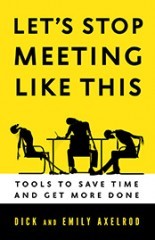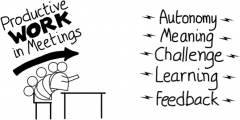Are meetings in your organization places where productivity goes to die? If you answered yes, you are not alone. There are 11 million meetings a day in the U.S. alone. Half are ineffective.
The problem with most meetings is that meeting leaders and participants do not think of them as places to do productive work.
An efficiency mindset prevails. How to get through the agenda as quickly and efficiently as possible becomes the driving force behind many meetings. This strategy may work to minimize the pain you associate with meetings, but it does not lead to a positive work experience.
In order to transform meetings into productive work experiences, look to two unlikely sources: the factory floor and video games.
What do the factory floor and video games have in common?
It is a proven fact that factory workers are more productive when they experience autonomy, meaning, challenge, learning and feedback while they do their work.
For meetings to become productive work experiences, we need to think of them as a place where work occurs. This means that autonomy, meaning, challenge, learning and feedback must become part of the meeting experience.
You can imagine our surprise when Colin Anderson, CEO of Denki, the company that created the award-winning video game Quarrel, approached us at a workshop we conducted and excitedly told us that autonomy, meaning, challenge, learning and feedback are similar to the principles his design team employs to create video games.
We learned that the extent to which these design principles are present determines whether the player becomes engaged in the game.
How elements of video games transfer to meetings.
- Autonomy – Build in autonomy by ensuring that participants can influence the meeting’s direction by going beyond offering input into agenda items and inviting meeting participants to design the meeting experience.
- Meaning – Determine if this meeting is work worth doing by asking: what do you want to be different because this group of people met? Ask why you are willing to put your own time and energy into this meeting.
- Challenge – Produce the right amount of challenge by making the meeting familiar and different at the same time, giving the participant the belief that this meeting will be time well spent.
- Learning and Feedback – Will meeting participants learn something new as a result of their meeting participation? Create an atmosphere where participants discuss whether this meeting was time well spent and how they can ensure that future meetings are time well spent.
7 tips to create a different kind of meeting.
You can make your next meeting a productive engaging work experience by rethinking your approach to meetings. To make your next meeting as engaging as a video game, make it one where:
1. There is a challenge to be met.
2. Meaning is present because you are doing work worth doing.
3. Participants feel invited to participate.
4. Feedback occurs so participants know how close they are to meeting the challenge.
5. Interest is built through variety and drama: new people, new ways of working, new settings.
6. Learning occurs: Participants leave smarter than when they arrived.
7. There is closure with clear decisions and assignments.
 Dick Axelrod is an author, speaker, and consultant who co-founded with his wife Emily The Axelrod Group, Inc., a consulting firm that pioneered the use of employee involvement to effect large-scale organizational change. In their work they seek to transform business interactions into human experiences. Dick has taught at American University, Columbia University, and the University of Chicago. Dick and Emily’s latest book is Let’s Stop Meeting Like This: Tools to save time and get more done.
Dick Axelrod is an author, speaker, and consultant who co-founded with his wife Emily The Axelrod Group, Inc., a consulting firm that pioneered the use of employee involvement to effect large-scale organizational change. In their work they seek to transform business interactions into human experiences. Dick has taught at American University, Columbia University, and the University of Chicago. Dick and Emily’s latest book is Let’s Stop Meeting Like This: Tools to save time and get more done.
Note from Jesse: This week marks the release of the much awaited newest book from Dick and Emily Axelrod: Let’s Stop Meeting Like This: Tools to save time and get more done. If you dread meetings, as most of us do, don’t miss this opportunity to learn how to transform your meetings to a place where important work gets done. I strongly recommend this enjoyable, easy to understand and implement guidebook. Don’t wait, get a copy before your next meeting. Better yet, get one for everyone on your team!














Thanx for sharing these ideas, they make a lot of sense. Can’t wait to try them.
Joe,
Thanks for comment. Please let us know how it goes.
Dick
Thank you Dick This is great information. I have recently joined a team that meets weekly. Everyone agrees it’s a complete waste of time. I think we break every rule you described. But no one wants to tell this to our boss, the team leader, who I guess thinks the meetings are great, since he doesn’t invite us to participate. Any suggestions on how to approach him?
Hi Chris,
This is tricky not knowing the people involved. Here are some things to consider.
Is the purpose of the meeting clear and understood by everyone involved? Are meeting participants willing to work towards achieving the meetings purpose?
Do meeting participants understand their role in the meeting, why they are there and what is expected of them?
What can meeting participants willing to do on their own to improve the meeting experience?
Who are people in the group that the leader trusts? Are they willing to talk about their desire to make the meetings more productive with the leader? Notice I say make the meetings more productive. You don’t want the meeting to be a “let’s blame the leader for our awful meetings” session. What ideas do they have? Are they willing to discuss them with the leader? These ideas should identify what everyone in the meeting can do to make it more productive.
If all else fails, slip your leader a copy of Let’s Stop Meeting Like This.
Best of luck. Let me know how it turns out.
Haha! I already thought of your last suggestion and ordered a copy of your book yesterday. By the way, love the cover!
Hi Dick
From personal experience way over 50% of meetings are ineffective, because far to many of them are really unneeded to begin with. In a digital era most reporting that goes on at meetings is nothing but self aggrandizement or an excuse for senior staff to vent at their subordinates. Lets be honest there are a vast array of ways to get status reports to all concerned, and chastising people who are trying is counter productive. Good meetings are places were people can openly discuss the problem issues they are facing so their co-workers can help them solve them, while also helping to prevent their reoccurrence anywhere else in the organization. The other truly useful meetings are the ones that discuss opportunities to improve an organization, these should end with people being assigned to look into the opportunity.
In a world were change is occurring at rates far faster than at any other point in history, wasting time on dealing with the past that does nothing to promote learning for the future is the biggest waste of resources in every organization.
As a leader of various types of organizations, I learned early to get through the reports as fast as possible if at all, while my biggest focus was on finding out what issues people faced and getting everyone to help solve those issues. The second biggest focus was on discussing new ideas and getting teams setup to investigate and possibly even act on them. You cannot build a future if you stay mired in the past.
Robert,
Thanks for your comments. I agree with what you are saying. A good meeting will help people discover the way things and elicit their ideas, hopes and dreams for the future. Creating an understanding of the way things are serves as a springboard for the future. Identifying what you want to create in the future serves as the pull that gets you there. Our Meeting Canoe(tm) framework is the way we think about how to design meetings where this can occur. http://axelrodgroup.com/meeting-canoe/
I would be satisfied if the challenge to be met could be not scheduling another meeting as the main conclusion of the current one!
Isn’t “proven fact” a tautology?